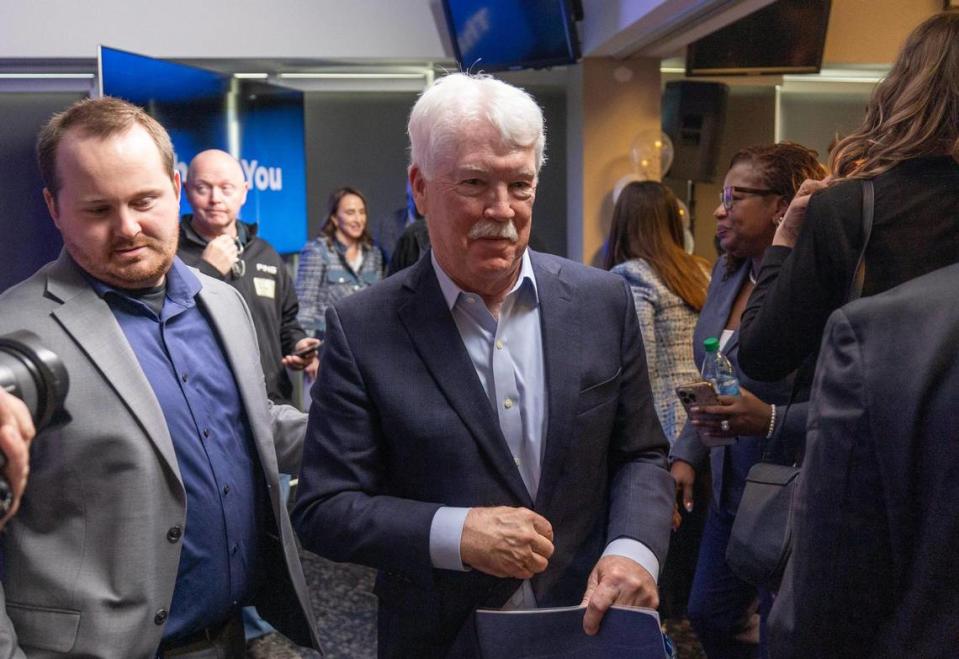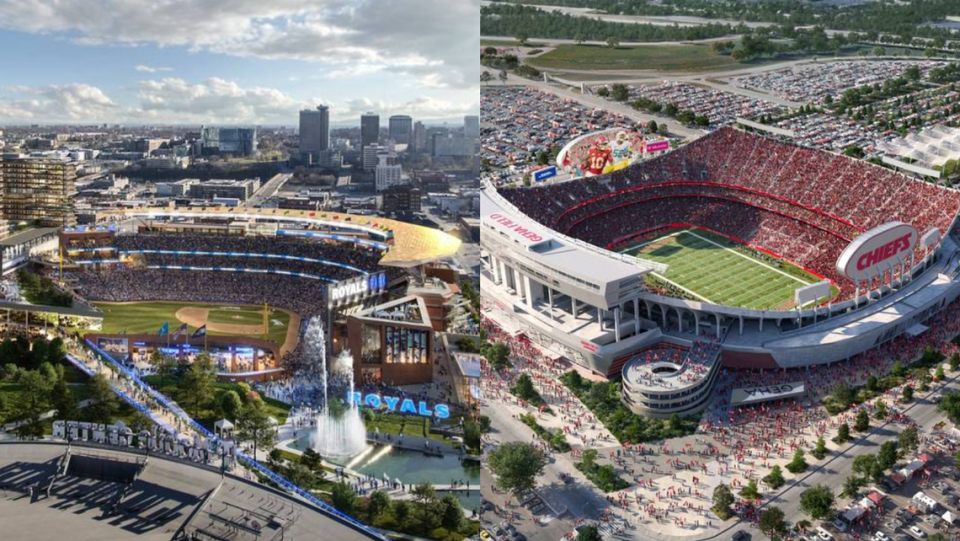Will the Chiefs and Royals leave KC if stadiums tax fails? Threats worked in the past
Would the Chiefs or Royals move across town or, heaven forbid, leave the area entirely, if Jackson County voters reject a 40-year sales tax that would help pay for a new Royals ballpark and major upgrades that the Chiefs have planned for Arrowhead Stadium?
They’ve never come out and said it, other than that the Royals are adamant that they will not be playing in Kauffman Stadium after their lease runs out at the end of the 2030 baseball season.
But the implied threat has been the theme of the teams’ marketing campaign to get the tax approved on April 2.
The message has been clear, albeit somewhat ambiguous, right down to the name the teams chose for their well-funded campaign committee — The Committee to Keep the Chiefs and Royals in Jackson County.
Pass the tax, or the teams could leave Jackson County? And if they did leave, to where? Kansas? The Northland, or somewhere like Nashville, Tennessee?
The answers have been left up to the voters’ imagination and the speculation of public officials.
“I think we’re in grave danger of losing one or both teams nearly immediately by the end of the year at the latest,” Jackson County Legislator Manny Abarca said in January after he voted alongside other legislators put the tax measure on the spring ballot.
More recently, Jim Rowland, executive director of the Jackson County Sports Complex Authority told KCUR’s Steve Kraske that keeping the teams would be “dicey” if the tax doesn’t pass.
The Coalition to Keep the Chiefs and Royals in Jackson County then pushed that audio out on its X social media account @YesOn1JacksonCo.
“Jackson County CAN’T risk losing the Chiefs and Royal…VOTE YES ON QUESTION 1!...,” the post added.
On Friday, Royals majority owner John Sherman was on Kansas City sports-talk radio station 610 to hammer home that same message, without coming right out and saying that would happen if the tax doesn’t pass.
“This is about sustaining ourselves as a major league city,” he said. “There’s lots of cities that would love to have these franchises.”
The host did not press him further, leaving listeners to wonder if Sherman would move his team, if things don’t work out the way he’d like on Election Day.

When the The Star asked the campaign committee that question directly, this was the response:
“Both teams have been consistent and clear: We are focused on a successful campaign and want to stay in Jackson County. If the vote doesn’t pass, both teams will consider all options.”
What’s on the line?
Question 1 asks voters to repeal the current 3/8th-cent stadiums sales tax that is set to expire in 2031 and replace it with a new 3/8th-cent tax that would continue to at least 2064.
If a majority says yes, the Royals have agreed to sign a lease keeping them in the county for the duration of the 40-year sales tax. The Chiefs say they would sign a 25-year lease, which would include options for three five-year extensions.
“It is the Chiefs hope that we would exercise the extensions,” the campaign committee said on Friday. “If not, it is our understanding that this half of the sales tax revenue would be available to the County to use for park purposes as authorized by the tax.”
Neither team had reached an agreement with the county on a lease deal as of Friday afternoon, so that remains unclear.
Part of the revenue raised by the tax would pay for a portion of the estimated $2 billion ballpark and surrounding district that the Royals want to build in Kansas City’s East Crossroads neighborhood immediately south of downtown. Part would go for the $800 million renovation project that the Chiefs have planned for Arrowhead Stadium, which the county also owns.
And part would go to sustain both stadiums’ repairs, maintenance and operations.
Both teams are also seeking assistance from the state of Missouri and Kansas City.
That the teams will not address the consequences of a no vote directly irks Tim Smith, campaign manager for the Committee Against New Royals Stadium Taxes.
“If you’re going to leave, if you don’t get this tax passed, at least have the decency to say it, that this is our business plan. If we don’t get this money, we’re going to take off,” Smith said. “It’s a fear-based campaign they’re running.”

Threats have worked
It wouldn’t be the first time. The possibility that Kansas City might lose one or both of its top two professional sports franchises loomed over two of three previous times that the Chiefs and Royals have asked voters for tax support.
(The outlier was the unsuccessful 2004 Bi-state II sales tax vote, in which the teams would have shared tax revenue with arts organizations. The threat of losing the teams was minimized in a campaign with the positive message “Think Big.”)
And both times there was a fear factor, in 1990 and 2006, the teams came out winners.
The teams’ original leases were set to run from 1972 to 1997. Arrowhead Stadium opened in 1972 and Kauffman, then known as Royals Stadium, opened that next spring
But those leases were renegotiated seven years early, in 1990, because both teams wanted taxpayer support to upgrade their stadiums. And local politicians feared Kansas City might lose one or both of them, if they didn’t act.
“History has demonstrated that teams will move away. There are lusher pastures,” the late Missouri state Rep. Phil Curls said at the time while trying to get a stadiums aid package through the General Assembly.
Kansas Citians needed no reminding. Many then well-remembered how the Kansas City Athletics bolted for Oakland in 1968. They overwhelmingly passed a ballot measure in April of 1990 that was far more modest than the current one.
It redirected $3.5 million a year in property tax revenue to the teams for stadium upgrades. To that amount, which hasn’t changed since, the state contributes $3 million a year, and Kansas City $2 million.
On the surface, it seemed like a pretty good deal, as it extended the leases to 2015. Except there was a catch. The 1990 leases shifted the burden for upkeep and upgrades at the stadiums from the teams onto county taxpayers. The county was required to keep both venues in “state of the art condition” with no dollar cap on those costs.
By the mid-2000s, both the Royals and Chiefs were complaining that their stadiums were not keeping up with the time. Newer stadiums had bigger video boards and plusher suites.
But the county didn’t have the money for any of that, and state lawmakers were skeptical that either team would leave the sports complex.
Clark Hunt, the newly minted chairman of the Chiefs at the time, bluntly disabused them of that at a May 2005 meeting in Jefferson City.
“If there’s no renovation of the sports complex, one or both of these franchises will be gone,” Hunt said.
That sobering notion hastened negotiations for the teams’ current leases that were signed in January of 2006, before county legislators approved language for an April ballot issue.
That April, county voters authorized the current 3/8th-cent sales tax, which went to pay for $425 million of the $575 million spent to renovate Kauffman and Arrowhead.
After the victory, the campaign manager for the Save our Stadiums committee, the late political consultant Steve Glorioso, observed that voters had gotten the message.
“I think the campaign struck the right balance between keeping the teams and the subtle threat that they might leave,” he said then.
‘Slap in the face’?
One of the co-chairs of the 2006 Save Our Stadiums campaigns was a former Royals player named Frank White.
Then the manager of the Royals’ farm club in Wichita, the eight-time Gold Glove Award winner went on to become one of the team’s broadcasters. He then had a falling out with the club before launching his decade-long political career — first as a county legislator, and now as the Jackson County executive who opposes the current ballot measure as it stands now.
The teams claim he slow-rolled the lease negotiations last fall and then fought him successfully in January after he tried to keep the tax measure off the ballot.
White said the county needed more time to work out deals with the teams that would be in the best interest of the taxpayers. The teams and a majority of county legislators disagreed.
When he told a TV reporter recently that he would not sign the leases, if they fail to meet his standards, the campaign committee lashed out in a social media post.
“Is Frank White really doing everything he can to keep the Chiefs and the Royals in Jackson County?” it read.
With seven years to go on their current leases and no chance of an early out because, unlike in 2006, the county is not in default, White finds the implied threat offensive.
He said county taxpayers have supported the teams for a half century. In 2009 and 2016, the county had signed leases in hand for voters to consider two months before casting their votes. With less than a month to go before Election Day, they don’t have that information this time.
The teams have not signed lease agreements yet. That means voters don’t yet know the total cost of the project, how much the county would be on the hook for, how much money would go back into the community for things like housing, jobs or education, or how many additional dollars the teams would seek from the city, county or the state.
“It kind of slaps people in the face,” White said in a recent interview.
But others say the campaign theme is a reflection of reality. The Royals and Chiefs are businesses who need to do what’s best for them.
On a recent TV broadcast with Fox4’s John Holt, a member of the campaign committee put it this way:
“If the sales tax doesn’t pass, everything’s back on the table,” said Bridgette Williams, executive director of the Heavy Contractors Association of Greater Kansas City. “That includes offers that have been made from other parts of the region, and other parts of the country.”
People should not take it for granted that the teams won’t leave, she said.
“These aren’t just scare tactics.”

